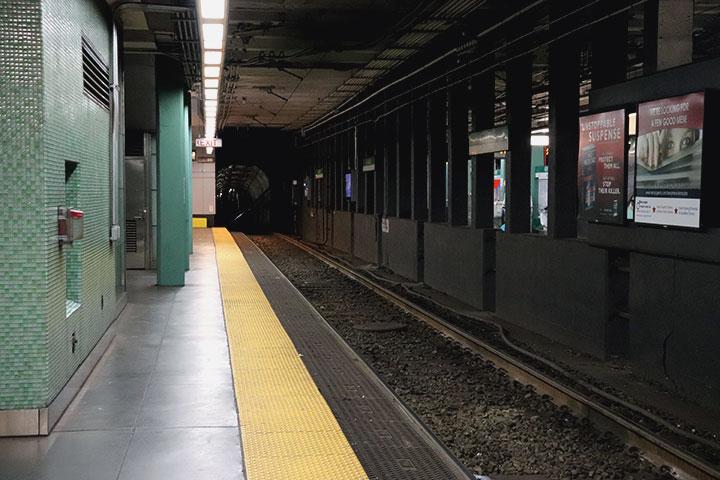Descending into the Kenmore Square T station is akin to traversing through a swamp for Boston University students looking to utilize the city’s transit system. Bright orange cones, “warning” tape and metal rails have scattered the insides of the corridor from the north entrance down into the station for months, protecting passengers from puddles of water that stagnate on the ground at all times.
Conditions like these are not unusual or even shocking, given the state of stations across Boston. Hundreds of MBTA stations and facilities are in states of disrepair beyond what is acceptable for a system of transportation that thousands of residents rely on.
The MBTA has begun to compile an inventory on the condition of its facilities, and a 2017 preliminary review showed that 57 percent of the T’s 378 facilities scored a 2 or less out of 5, meaning they need significant repairs. 78 facilities received the lowest rating possible.
Dripping ceilings, broken equipment and crumbling infrastructure are regular — and embarrassing — sights at stations from Harvard Square to Winchester. In the worst case, an Alewife parking garage was shut down in August after falling concrete wrecked a car.
Massachusetts Transportation Secretary Stephanie Pollack said the MBTA is prioritizing buying new vehicles and improving tracks, as these issues more directly affect commutes, above upgrading stations. It’s true that most commuters, if asked, would probably choose to have a train that runs on time above a station that doesn’t have puddles on the ground. But it’s ridiculous that, in Boston, they should have to choose.
An increase in funding will excuse the MBTA from having to choose between providing reliable service and providing accessible service. Nobody likes paying taxes, but a progressive tax increase for repair funds in neighborhoods serviced by the MBTA is necessary. Residents of these neighborhoods have a responsibility to uphold the T’s quality of service.
And deteriorating stations do pose health risks to commuters. While some passengers may have no problem dodging puddles in corridors and climbing up and down slippery steps, elevators that aren’t functioning and stations that are flooding present serious accessibility risks for passengers who are disabled or have issues traveling.
The alternative to a tax increase — which would target those able to pay a little extra — is a fare increase that would hit all passengers equally. Raising fares makes the transit system prohibitive to those who need it the most. Officials at the MBTA have said the T may be forced to raise fares by 2019 to offset a budget deficit, something that threatens the system’s accessibility. For many BU students, it’s already difficult to afford a $2.25 trip down Commonwealth Avenue. Students often sacrifice timeliness and convenience to wait for the notoriously unreliable BU Bus.
Boston can find ways to incentivize public transit and drive up the MBTA’s revenue as well.
London utilizes a congestion fee, charging people for driving cars during rush hour. Cities around the world are turning traffic-heavy streets into pedestrian-only streets, encouraging people to leave their cars behind.
The T shouldn’t have to operate, as Boston City Councilor At-Large Michelle Wu said, from a “point of scarcity.” It’s embarrassing that a transit service supplying our city with 1.17 million trips on an average weekday is not treated as a funding priority.
T ridership has declined over the past three years. If service continues to worsen, ridership will continue to decrease, exacerbating the T’s struggles to take in revenue.
The MBTA is taking tangible steps to bring the T up to national standards, but some factors are out of their control. As Boston becomes more crowded, demand upon the system increases, and they simply do not have the money to keep up. Reliable, safe and accessible service is essential to Boston’s infrastructure, and raising taxes is the only way to bring in revenue.





















































































































